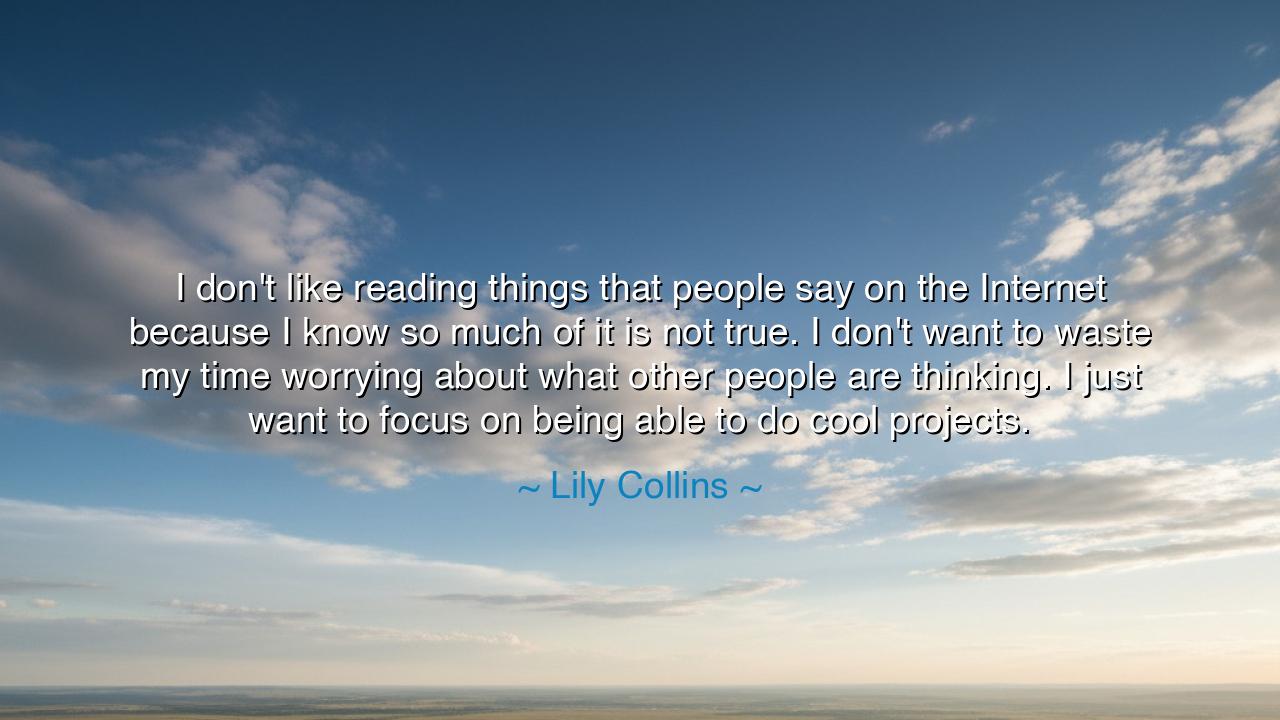
I don't like reading things that people say on the Internet
I don't like reading things that people say on the Internet because I know so much of it is not true. I don't want to waste my time worrying about what other people are thinking. I just want to focus on being able to do cool projects.






In a world that is saturated with information—often unverified and distorted—it is easy to become overwhelmed by the noise that surrounds us. Lily Collins’ words, "I don’t like reading things that people say on the Internet because I know so much of it is not true. I don’t want to waste my time worrying about what other people are thinking. I just want to focus on being able to do cool projects," speak to the power of focus and the importance of guarding one’s mind from the distractions of the world. In an age where the internet is both a tool and a battlefield for truth and misinformation, Collins advocates for clarity—a call to turn away from the clamor of external opinions and instead immerse oneself in the work that matters most to us. It is not what others think of us that defines us, but what we choose to create with the time we have.
In the ancient world, the Socratics taught that the key to living a meaningful life lay in the pursuit of virtue, not in the opinions of others. Socrates himself was famously indifferent to the judgments of the masses, and it was this detachment from public opinion that led him to challenge the norms of Athenian society. He knew that true wisdom came from within, from an understanding of one's own soul and the commitment to living authentically. Similarly, Plato, his student, espoused the idea that the philosopher must not be distracted by the trivialities of the world, but should focus instead on the pursuit of higher truths and the greater good. Collins’ reluctance to absorb the noise of the internet mirrors this ancient wisdom: by focusing on what truly matters, one can achieve a life of purpose and meaning.
Consider the story of Alexander the Great, who, while leading his vast empire, faced constant criticism and envy from those around him. His battles were not only physical but mental—he had to guard his mind against the falsehoods and rumors that often spread through his ranks. But what set him apart from others was his focus on his vision of a united world, a vision that transcended the petty opinions of others. Alexander's ability to disregard the distractions and focus on his mission allowed him to achieve feats of unimaginable scale. Like Collins, who chooses to direct her energy toward her projects, Alexander understood that external opinions, especially those rooted in ignorance or jealousy, are distractions to the larger, more meaningful journey.
In more modern times, Mahatma Gandhi offers a parallel example. When he led the Indian independence movement, he faced immense criticism from both the British authorities and those within his own country. Yet, he remained resolute in his mission of nonviolent resistance. He did not allow the clamor of the outside world to sway his commitment to his principles. Gandhi knew that true power lay not in the approval of others, but in remaining faithful to one's convictions and acting with integrity. His ability to filter out the noise of criticism and to stay focused on his cause is a lesson that we can all draw from, especially in an age where external distractions often feel overwhelming.
The lesson here is clear: the opinions and judgments of others, especially those found in the anonymous expanse of the internet, do not define us. Focus is the key to meaningful achievement. It is far too easy to get caught in the web of others’ thoughts and words, to let the voices of strangers determine our self-worth. But as Collins rightly points out, our time is precious, and we must choose to spend it on the things that truly matter—on the projects and pursuits that give our lives meaning and purpose. Just as the ancient philosophers encouraged individuals to turn inward, to cultivate their inner strength and vision, so too must we today resist the temptation to be swayed by external noise.
In practical terms, this means taking control of the information we consume. We must be mindful of the content we allow to influence our thoughts and emotions, especially in a time when misinformation is rampant. Like Collins, who chooses to focus on her creative projects, we too can choose to channel our energy into constructive and meaningful pursuits. It means setting boundaries, protecting our minds from the toxicity of unverified opinions, and devoting ourselves to work that feeds our soul—whether it is in art, business, or personal growth.
Ultimately, Collins’ words remind us of the importance of living a life defined not by the judgments of others, but by the impact we wish to have on the world. Focus on what you can create, on what truly matters to you. By doing so, you will not only silence the distractions but also find a sense of peace and purpose that allows you to live freely, authentically, and without regret.






AAdministratorAdministrator
Welcome, honored guests. Please leave a comment, we will respond soon